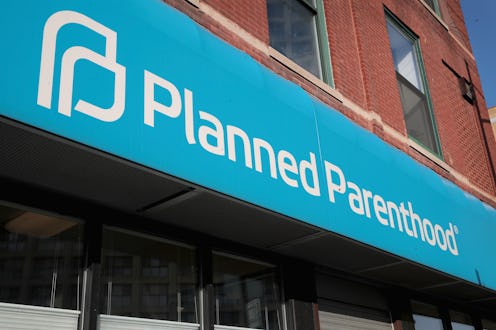Life
Planned Parenthood Launched A Tool To Help You Find Abortion Providers Near You

Abortion is still legal in every state in the U.S., but not everyone knows that. The recent slew of anti-abortion restrictions have created widespread confusion about where and how far along in pregnancy abortion is available across the country. On Nov. 12, Planned Parenthood released the Abortion Care Finder to help clear up some of that confusion and increase access to abortion.
The Abortion Care Finder's name says it all: the digital tool helps people find nearby abortion care. On the Finder webpage, a pregnant person can type in their age, zip code, and the last day of their last period. The Finder will tell them where the nearest Planned Parenthood clinic is, and what kind of abortions that clinic provides — surgical, medication, or both. It also uses the date of the person's last period along with their location to provide them with a primer on how abortion laws in their state will affect them.
Kevin Williams, Planned Parenthood Federation of America's (PPFA) national director of digital products, told Mashable, "We created the tool because we know that there was a need coming from people actually concerned about abortion becoming more and more restricted."
In May, after Alabama Gov. Kay Ivey signed a bill that bans nearly all abortions, abortion providers in the state were overwhelmed with frantic phone calls asking if abortions were still available. Barbara Ann Luttrell, director of communications and marketing for Planned Parenthood Southeast, which serves patients in Georgia, Mississippi, and Alabama, told VICE that just after the bill was signed, panic and confusion were at an all-time high. “It’s never been to the point that folks don’t know that abortion is legal," she said. "And that’s for good reason, because this is the most extreme legislation we’ve seen passed since Roe v. Wade.”
On Oct. 29, a U.S. District Court judge issued a preliminary injunction against the Alabama law, which stopped it from taking effect on Nov. 15, according to Vox. But injunctions and other court decisions that affect abortion laws often aren't something that the average person keeps up with, making it hard for many people to know what abortion access is like in their state. The Abortion Care Finder will help address that problem while also giving people information about the care they need.
I live in North Carolina, a state with a number of restrictions on abortion access. I put in my age, zip code, and input the last day of my last period as Oct. 5. The Finder shows that the nearest health clinic to me is about a 50-minute drive from where I live, and shows a total of five abortion-providing Planned Parenthood clinics in North Carolina.
If I click on a plus arrow to see more information about a clinic, it also gives me brief background on North Carolina's abortion restrictions. At the time of publication, the background section says the state doesn't require you to attend mandatory counseling prior to an abortion, which would require two trips to the clinic, but North Carolina does mandate that patients receive state-directed counseling "that includes information designed to discourage the patient from having an abortion." Patients then must wait 72 hours before the procedure is provided, according to reproductive health research organization the Guttmacher Institute. (A Planned Parenthood representative confirmed to Bustle via email that this discrepancy was a technical glitch that will be resolved shortly.)
While the tool may have some kinks that still need to be ironed out, it will make finding access to abortion easier. You can also book an appointment directly through the Finder. Mashable notes that it doesn't include info about how much the procedure will cost, and it also only refers people to Planned Parenthood clinics — it doesn't include other abortion providers who aren't affiliated with the organization. Still, the tool is no doubt a helpful one, as abortion lawsuits continue to make headlines and only further muddle public understanding of abortion access.
This article was originally published on